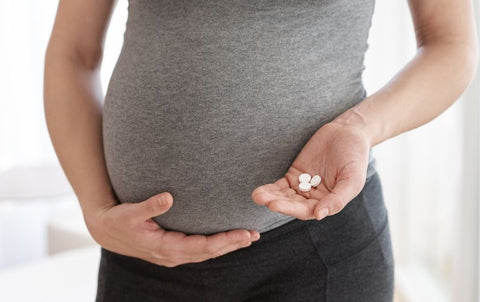Your body needs a lot of nutrients when you're growing a baby. Prenatal vitamins fill these gaps to support your entire pregnancy journey.
Congratulations! You're starting the adventure of a lifetime! During the next 40 weeks, your body will need a lot of extra nutrients. Your first step on this journey should be finding the best prenatal supplements and vitamins.
It can be difficult to ensure you get these extra amounts of nutrients just from your diet, especially with pesky pregnancy cravings and aversions. Prenatal vitamins are loaded with nutrients that are not only essential for your and your baby's health but that are commonly depleted during this time.
Prenatal Vitamins: Everything You Need to Know + Benefits

It can be tough to navigate the dos and don'ts of pregnancy. Taking prenatal vitamin supplements helps ensure your body has the nutrients it needs to grow a healthy baby.
There are many kinds and brands. For example, you can get prenatal vitamin gummies, capsules, tablets, and powder or liquid forms. There's a lot to choose from!
But pregnancy is already complicated enough; the last thing you need to worry about is which supplements to take. That's why we're here to tell you the ins and outs of prenatal vitamins so you can return to enjoying your journey.
When to Start Taking Prenatal Vitamins
For those planning to have a baby, it's never too early to start stocking up on baby supplies and taking prenatal vitamins. Much like daily multivitamins, these supplements ensure your body gets enough nutrients. Taken daily before or during pregnancy, they help your body support your little one-to-be.
Many experts recommend taking prenatal supplements before you get pregnant. Prenatal supplements not only support your baby's growth but their conception.
If you don't take them before you're pregnant, you should take them as soon as you get a positive test. Babies get all their nutrients from you. This makes it easy for you to become deficient, so it's important to stock up.
Prenatal Vitamins Before Pregnancy
Prenatal supplements can help you before you're pregnant, as well as during pregnancy. Indeed, your doctor may even prescribe it for you.
Pregnancy is a critical time for optimizing health and nutrition both for you and your baby. Let's take a closer look at how they can help.
Benefits of prenatal vitamins:
- Cuts back on nausea. Vitamin B6 helps reduce nausea. Research finds that prenatal vitamins can reduce morning sickness in the first trimester.
- Reduces risk of congenital disabilities. All prenatal supplement vitamins include folic acid. Studies show that folic acid can reduce the risk of neural tube defects in your developing baby.
- Promotes proper development. Vitamin D helps your baby's bones develop as it increases calcium absorption. Studies show that taking vitamin D while pregnant increases your and your baby's health.
Choosing the Best Prenatal Vitamins
There seem to be endless choices of prenatal supplements available. So, which should you choose?
When to Stop Prenatal Vitamins
Prenatal vitamins can still be important after giving birth. Indeed, experts recommend that you continue taking them for as long as you breastfeed.
Additionally, they help ensure your milk provides enough nutrients for your baby. They also ensure you get enough nutrients to stay healthy, and a healthy mom means a healthy baby!
Research also suggests that vitamins may improve your mental health postpartum. Deficiencies in B vitamins, vitamin D, and minerals may influence postpartum depression. Ensuring you get enough of these could help prevent this.
Things to Avoid During Pregnancy
Taking supplements is important, but they won't do anything if you aren't living a healthy lifestyle. It may be hard to let go of some habits, but it's best for you and your baby.
Some things to avoid during pregnancy include:
- Smoking – smoking while pregnant could cause a stillbirth or premature delivery. Nicotine and Carbon monoxide (the two main cigarette ingredients) reduce your baby's oxygen supply.
- Alcohol – any alcohol you consume reaches your fetus within 20 minutes. It's poisonous for your baby, and no amount is safe.
- Toxins – avoid certain harmful chemicals such as paints, varnishes, hair dyes, and glue.
Foods to avoid during pregnancy include:
- Caffeine – limit intake to 300mg a day
- Herbal teas – some herbs are harmful while pregnant. Avoid herbal teas without ingredient lists.
- Mercury – some fish are higher in mercury than others. These include Bigeye (Ahi) tuna, shark, marlin, and swordfish. Choose fish low in mercury such as salmon, rainbow trout, Atlantic mackerel, sole or Dover sole.
Final Thoughts
To grow a healthy baby, you need to be healthy first. Taking prenatal vitamins before, during, and after pregnancy ensures you get the nutrients you need to support yourself and your baby.
Which prenatal vitamins will you try? Let us know in the comments below!






